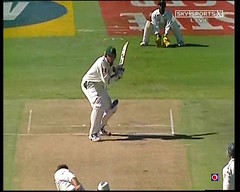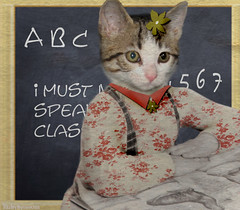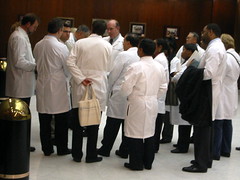In the next few minutes I will give my view on this issue. Let's have some examples. When I watch a game of cricket on tv, I understand absolutely nothing and there are just some people in white running to and fro. There are some recognizable things involved such as a ball, a bat and some protective equipment. I quickly turn it off. Likewise I find golf tedious and boring. It is about getting a little white ball into a hole using as few strikes as possible. I could go on with curling, American football and so on. Actually, all are sports I don't understand.
I guess this is how my dear mother understood football (i.e. soccer). I presume she saw a bunch of men (only men when she was alive) running to and fro on a grass field. Presumably, she new that the ball should be kicked into the goal just as I know that the golf ball should end up in that little hole in the grass.
What I am trying to say here is that anyone who is ignorant of a game or ignorant generally perceives in an ignorant/restricted way. The keyword here is perception.
As soon as we have some knowledge of a sports game or anything else we perceive in different way. As soon as we know that the players in the football team have different tasks to solve, as soon as we know the rules of games generally we become quite different perceivers. And if we turn our attention to the players in the field, they know the rules and they will definitely perceive the game differently after they have heard the coach's strategic plans for the match. But let us leave the sports games and turn our attention to traditional cognitive domains (of course sports are cognitive domains, too).
I have tried to show that conceptual knowledge is not something you just know or "have". Instead, conceptual knowledge changes your perception. I have sometimes used the metaphor of a torch with which you light up certain areas while letting others remain in darkness. It is not a bad metaphor cause when you have a certain theoretical perspective you perceive the world in a certain way whereas individuals with other theoretical perspectives perceive in a different way. I guess national economy - not to mention politics - could be illustrating examples here.
When we turn our attention to learning we all know that there are theories trying to explain how learning occurs and the mechanisms involved. Being a novice in a field I think it is quite common to view theory as a prescription for how to do. Learning theories are not to-do-lists! Let us see if I can explain this.
Take language and writing as an example. I think we all have been taught or in some other way have been told that grammar knowledge is necessary to write properly and maybe even to speak.
However, communication is fundamentally human and such communication certainly does not need a formalized grammar to work. But how about writing? Well, text is a very sophisticated technology to turn sounds into signs on some medium for example paper or more common today, computer documents. Does all that mean that without grammar you can neither talk nor write properly or comprehensible? Of course not!
I cannot know for certain but I don't think that the majority of authors put grammar first when producing interesting books. In the worst of cases you produce faultless nonsense with your grammar knowledge. Let me give an example. When I was in secondary schools, I was very good at grammar, particularly when we studied German. I knew all the paradigms, rules and word endings, I could analyze sentences and even write without errors. Still I was very bad at speaking because the grammar was like a judge on my shoulder judging every word for their proper endings. Accordingly there was no communication!
Might this be equivalent to teaching, meaning that you need to know about learning theory to be able to teach? Of course not! To teach someone something is also a fundamental undertaking that people have done since time begun. Anyone knowledgeable might tell and show the yet ignorant, just as even my mother might have kicked a football, hopefully into the right goal. So why do we need learning theories, then, if anyone can teach the ignorant?
On the one hand, teaching is a matter of training and practice. The one who teaches every day acquires some competence even without learning theories. The one who observes the doctor for some time might also appear as a doctor dressed like a doctor and saying the right words, maybe the nice comforting words to the anxious patient. Afterwards the patient might even tell others about the nice new doctor. Of course, this is a fictitious example but still it has occurred among doctors and even pilots in large airliners. Consequently, we can also appear as teachers and even be appreciated as good teachers. Sometimes we say that s/he is working as a teacher (cf. to be a teacher). But where does this strange reasoning lead us? Is it just a matter of being a good imitator? I think not!
When you have conceptual knowledge, like the real doctor, the real pilot, the real teacher, you are a different because you perceive differently. Therefore learning theories (biomedicine, aviation) are not prescriptions on how to to in the first place (as I was taught to view the German grammar) even if they could give the practitioner some guidance.
Student teachers often say, when they practice during their training, that they want to apply the theories they have studied. I don't think it works that they. On the contrary, I think that theories viewed that way could even harm or damage the enthusiasm of teaching like the grammar did for my ability to speak German. Actually, I think that grammar generally has made lots of people afraid of writing, fearing that they will make mistakes they don't understand they do.
As I said earlier, there can be many excellent teachers without theoretical knowledge of learning theories. What is important, though, is that like the fake doctor and the fake pilot, the fake instructor is restricted to what s/he has picked up from others and then tried. If it worked out well it might be taken as an indication of how it is and not how it happened to be a successful move.
Having access to the practitioners conceptual tools, we can vary our activities according to the needs. This might also be a skill we acquire as a result of experience but conceptual knowledge will also constitute the foundation for decisions not directly linked to a particular situation. The individual with conceptual knowledge, actually has a much better ability to perceive more general aspects of a situation.
If a sentence doesn't work or sounds strange it is a great ability to be able to analyze grammatically but usually not while talking. Likewise you reflect on your teaching sessions sometimes before, sometimes afterwards and eventually even simultaneously when you have the tools for reflection. And this is of course a cyclic process meaning that experience and theoretical reflection nurture each other so that your teaching develops continuously. Without your conceptual tools you are tied to each specific event.
You might be a better teacher just teaching but I would say that the conceptual knowledge is a very efficient shortcut in that process. And above all, it gives you the ability to leave the actual situation and enter a conceptual level when you discuss teaching with your colleagues. And this is absolutely crucial for the development of teaching and learning. It frees the knowledge development from the individual, meaning that a certain achievement or development of the teaching practice at your department does not disappear when a certain person is not longer available. That is the way conceptual knowledge has always worked. It figuratively leaves the individual and the particular instances and joins the body of conceptual knowledge in a particular domain.
Still practice is here and now and you will neither be able to speak German nor to teach others only relying on theoretical knowledge. Someone said: Practice without theory is like a bird never being able to lift off from the ground; on the other hand, theory without practice is like flying never being able land.
/Lars-Erik Jonsson

Detta verk är licensierat under en Creative Commons Erkännande-IckeKommersiell-DelaLika 4.0 Internationell Licens.











I have revised minor parts of this post where noticed some contradictions.
SvaraRadera